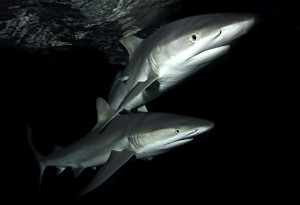For the average person, the word “shark” conjures up a host of different, often nightmarish visions. A black fin silently breaking the water. A pair of black, unblinking glass-like eyes. A mouth with row after row of razor-sharp, knife-like teeth gaping open, racing in for a bite. The image of sharks causes a gut reaction for most people, most often fear, anxiety, and even hatred. But there are groups of people out there who actually like sharks–are passionate about sharks–and are eager to educate the public about the truth regarding some shark myths. We here at Passions of Paradise love our sharks, so in response to recent news items highlighting the need to promote shark conservation, we thought we’d debunk some shark myths in an effort to educate our passengers, and help them appreciate one of the Great Barrier Reef’s most spectacular, albeit misunderstood, families of creatures. So read below for the top 3 shark myths we’ve busted to put your mind at ease.
Myth #1: All sharks are big, with sharp pointy teeth.
FALSE! There are over 400 species of sharks, and most species, about 80%, don’t grow bigger than two metres (about 6 ½ feet). There are many species of sharks that don’t have teeth, including the largest shark (and fish) in the world, the whale shark. Other species, like the epaulette shark, have flat teeth, more like a grinding stone, that the shark uses to open shells and crush small prey. Even big sharks with rows of pointy teeth are mostly harmless; the Australian Grey Nurse Shark (also known as the Sand Tiger) can usually be seen floating effortlessly in mid-water; while it’s mouth looks frightening with rows of long, needle-like teeth, there has never been a documented bite on a human being.
Myth #2: Sharks love eating humans.
FALSE! Shark bites are extremely rare, and in most cases, the word ‘attack’ isn’t really accurate. Sharks are rarely aggressive towards humans in the water when unprovoked, and often swim near to investigate this strange addition to their natural environment. So why do sharks bite humans?
Most often, it is a case of mistaken identity and curiosity. The shark has mistaken the person in the water for something it would usually eat; the white sole of a foot for an injured fish, or the splashing of a swimmer for a wounded seal. Sharks don’t have hands, so the way they investigate things in their environment is to mouth them. Have you ever ordered a dish at a restaurant because it looks interesting, taken one bite, and immediately wanted to spit it out? This is what happens in almost every instance of a shark bite on a human–the shark realizes the human is not its normal food, spits it out, and swims away. However, more people are bitten by dogs, cats, snakes,horses and even geese EACH YEAR than have ever been reported being bitten by sharks since record-keeping began.
Myth #3: The ocean is teeming with millions of sharks
TRUE (for now). The numbers for shark deaths every year are staggering: Over 11,000 per hour, 200,000 per month, 70 million per year. While sources and estimates vary, the general consensus in the scientific community is that shark populations are decreasing at an alarming rate. Sharks, unlike other species of fish, do not lay millions, or even thousands of eggs. Most sharks take anywhere from 5 to 15 years to reach sexual maturity, and on average produce about 2-3 young per breeding cycle (depending on the species). Shark fishing worldwide is done for various reasons–sportfishing, homeopathic medicines, traditional foods–but with the continuing decline, scientists estimate that as many as 90% of shark species could face extinction within the next 50 years. There is good news: many countries, such a the United States, New Zealand, Mexico, South Africa, and Fiji are taking steps to improve shark conservation and fisheries practices.
So, as you prepare to come to the Great Barrier Reef with Passions of Paradise, we hope that by reading this information, you feel at ease with the idea of snorkeling and diving with these amazing ocean animals. Keep your eyes open, because the species of shark we usually encounter (whitetip reef sharks [pictured]) are notoriously shy. One thing is for certain: Once you see these amazing predators in their natural environment, you will never feel the same way about sharks again! Special thanks to Project AWARE, World Wildlife Fund, and the Oceania Chondrichthyan Society for our shark facts.
Article by Russell Hosp
Environmental Sustainability Coordinator
Passions of Paradise
Image Courtesy of Mike Callander

